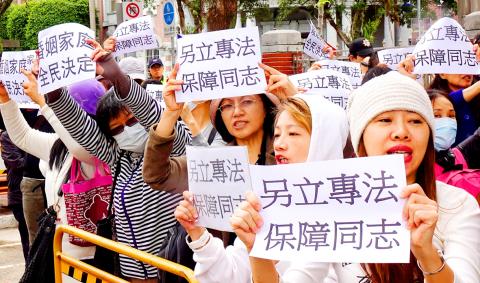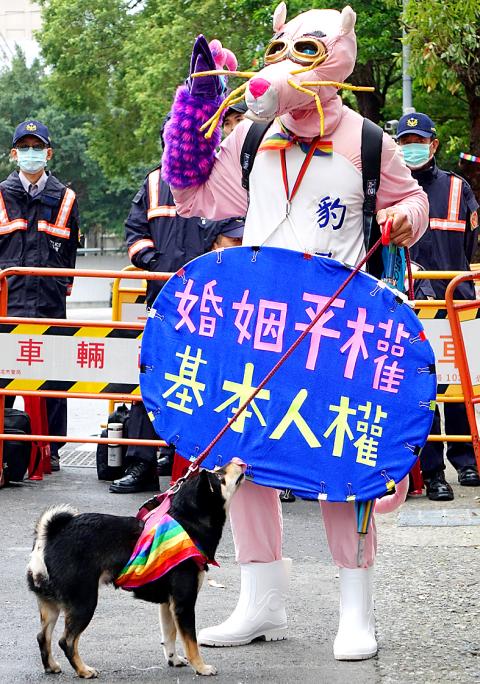Supporters and opponents of same-sex marriage presented their viewpoints at a mostly peaceful public hearing at the legislature in Taipei yesterday, with recommendations for and against amending the Civil Code or drafting a separate bill specifically to protect the rights of homosexuals and same-sex couples wishing to marry or adopt children.
While the debate continued at the hearing held by the legislature’s Judiciary and Organic Laws and Statutes Committee, a coalition of religious and conservative organizations held a rally opposing same-sex marriage at the front gate, while lesbian, gay, bisexual and transgender (LGBT) groups and campaigners organized activities in support of their cause at the side entrance on Jinan Road.
It was the first of two mandated public hearings on the issue after Chinese Nationalist Party (KMT) legislators managed to stall proceedings at last week’s committee meeting to review the various amendments.

Photo: Chu Pei-hsiung, Taipei Times
At that time, a protest against same-sex marriage attended by about 20,000 people, organized by the Alliance of Taiwan Religious Groups for the Protection of Family, was held outside the legislature, with about 60 protesters storming the compound in the afternoon.
At yesterday’s hearing, Yen Cheng-fang (顏正芳), a psychiatrist specializing in children’s issues, said homosexuals should have the equal rights as the rest of society to enter into a marriage, form a family and raise children.
“LGBT persons will not cause unhealthy development in children, the problem is social discrimination. My studies indicate children raised by same-sex couples are just as healthy in their mental and personal development as those raised by heterosexual couples,” Yen said.

Photo: Chu Pei-hsiung, Taipei Times
Kaohsiung Presbyterian minister Tsai Wei-en (蔡維恩) said that most Presbyterian churches and their congregations are opposed to the legalization of same-sex marriage.
“We represent the silent majority of Taiwanese. There are many people who are against [same-sex marriage], but were not given opportunity to express their opinion,” Tsai said.
Tsai said he has empathy for homosexuals and their plight, “but to legalize their marriage and other rights, it is in reality an oppression as it deprives the rights of a majority of people.”
Former New Party legislator Hsieh Chi-ta (謝啟大) said she is opposed to legalizing same-sex marriage as the issue has created much conflict and division in society.
“Marriage is not a legal right granted by the government, it is a social institution to have a family for propagating the next generation,” Hsieh said.
“The bill is not necessary, because Taiwanese do not discriminate, we are a very tolerant society ... even someone with Asperger syndrome can be elected mayor,” she said, referring to Taipei Mayor Ko Wen-je (柯文哲).
“If I see a cockroach, it does not mean there is only one, but that there are hundreds of cockroaches behind it,” she said, accusing the Ministry of Justice of failing to conduct in-depth analysis and take into consideration the “domino effect” when it studied same-sex marriage issues in other nations.
She cited an Academia Sinica study that said that only 0.2 percent of the population profess to being homosexual, while 1.9 percent identify as bisexual.
“How can we allow a minority to dictate policies for the vast majority of people. If the bill passes, it will destroy the fundamental structure of society,” she said.
Gay rights activist Chen Chih-ming (陳志明) called for the nation to be more progressive and to entrench LGBT rights as has been done in other advanced nations.
“We are just asking the nation to protect and guarantee our equal rights as citizens without discrimination. We also want to have a loving spouse, but cannot do so under the current law,” Chen said.
Some participants said it would be better to draft a separate bill specifically to protect the rights of homosexuals and same-sex couples rather than amending the Civil Code.

Three batches of banana sauce imported from the Philippines were intercepted at the border after they were found to contain the banned industrial dye Orange G, the Food and Drug Administration (FDA) said yesterday. From today through Sept. 2 next year, all seasoning sauces from the Philippines are to be subject to the FDA’s strictest border inspection, meaning 100 percent testing for illegal dyes before entry is allowed, it said in a statement. Orange G is an industrial coloring agent that is not permitted for food use in Taiwan or internationally, said Cheng Wei-chih (鄭維智), head of the FDA’s Northern Center for

LOOKING NORTH: The base would enhance the military’s awareness of activities in the Bashi Channel, which China Coast Guard ships have been frequenting, an expert said The Philippine Navy on Thursday last week inaugurated a forward operating base in the country’s northern most province of Batanes, which at 185km from Taiwan would be strategically important in a military conflict in the Taiwan Strait. The Philippine Daily Inquirer quoted Northern Luzon Command Commander Lieutenant General Fernyl Buca as saying that the base in Mahatao would bolster the country’s northern defenses and response capabilities. The base is also a response to the “irregular presence this month of armed” of China Coast Guard vessels frequenting the Bashi Channel in the Luzon Strait just south of Taiwan, the paper reported, citing a

A total lunar eclipse, an astronomical event often referred to as a “blood moon,” would be visible to sky watchers in Taiwan starting just before midnight on Sunday night, the Taipei Astronomical Museum said. The phenomenon is also called “blood moon” due to the reddish-orange hue it takes on as the Earth passes directly between the sun and the moon, completely blocking direct sunlight from reaching the lunar surface. The only light is refracted by the Earth’s atmosphere, and its red wavelengths are bent toward the moon, illuminating it in a dramatic crimson light. Describing the event as the most important astronomical phenomenon

UNDER PRESSURE: The report cited numerous events that have happened this year to show increased coercion from China, such as military drills and legal threats The Chinese Communist Party (CCP) aims to reinforce its “one China” principle and the idea that Taiwan belongs to the People’s Republic of China by hosting celebratory events this year for the 80th anniversary of the end of World War II, the “retrocession” of Taiwan and the establishment of the UN, the Mainland Affairs Council (MAC) said in its latest report to the Legislative Yuan. Taking advantage of the significant anniversaries, Chinese officials are attempting to assert China’s sovereignty over Taiwan through interviews with international news media and cross-strait exchange events, the report said. Beijing intends to reinforce its “one China” principle